Unit 2 What time do you go to school?Section B 词汇讲解课件(共有PPT22张)
文档属性
| 名称 | Unit 2 What time do you go to school?Section B 词汇讲解课件(共有PPT22张) | 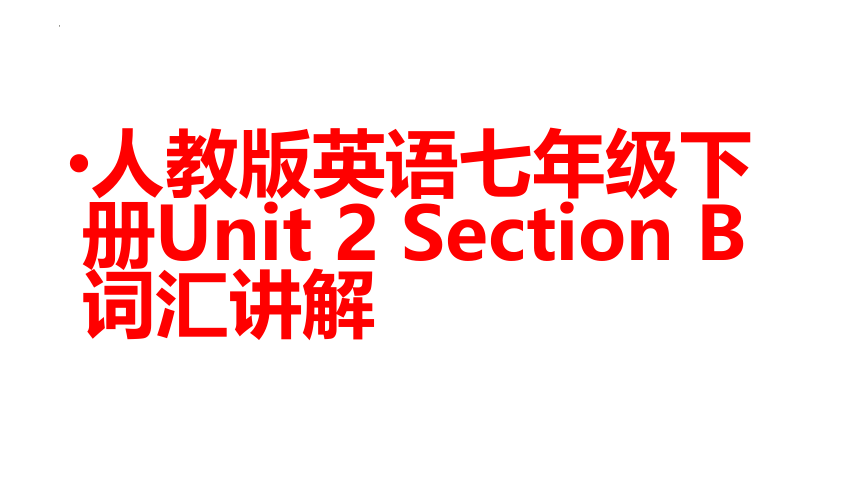 | |
| 格式 | zip | ||
| 文件大小 | 871.1KB | ||
| 资源类型 | 教案 | ||
| 版本资源 | 人教新目标(Go for it)版 | ||
| 科目 | 英语 | ||
| 更新时间 | 2022-02-28 14:42:59 | ||
图片预览

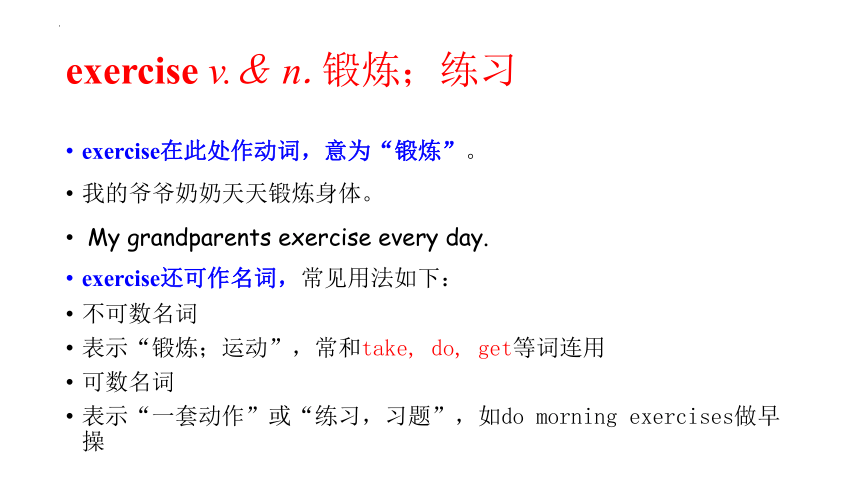
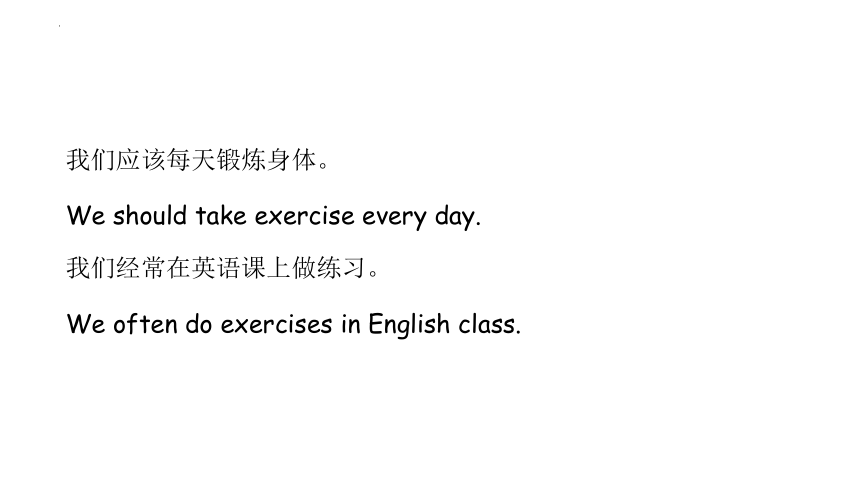
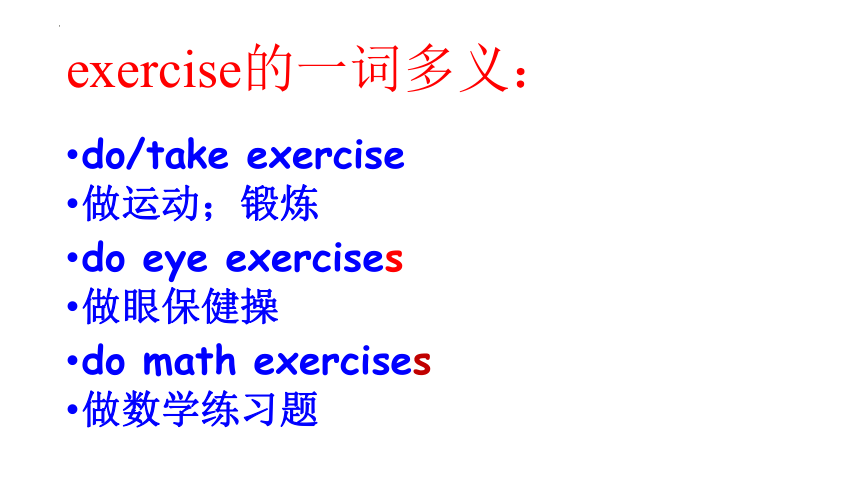
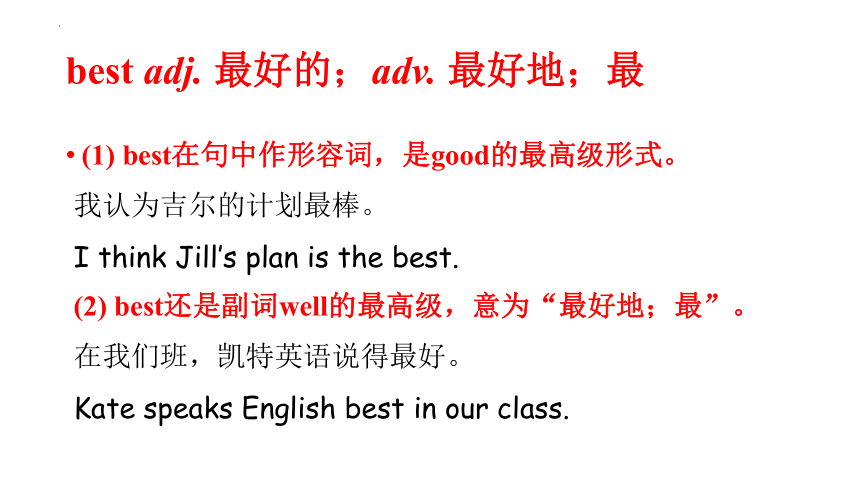
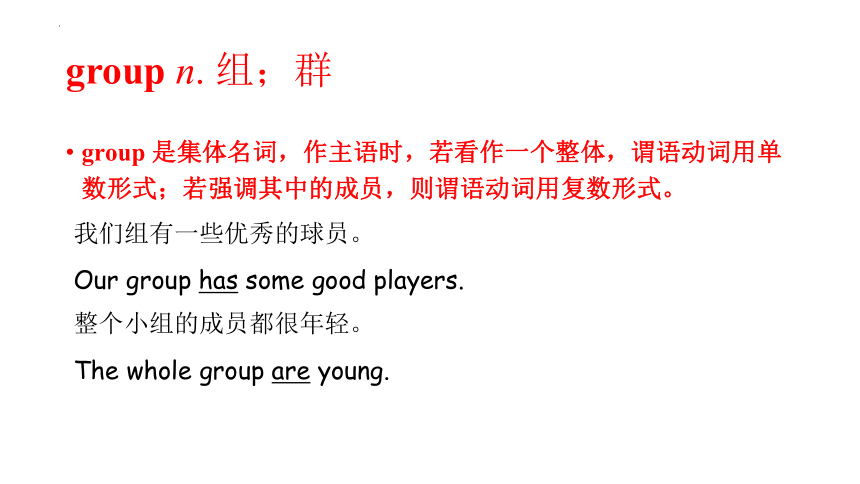
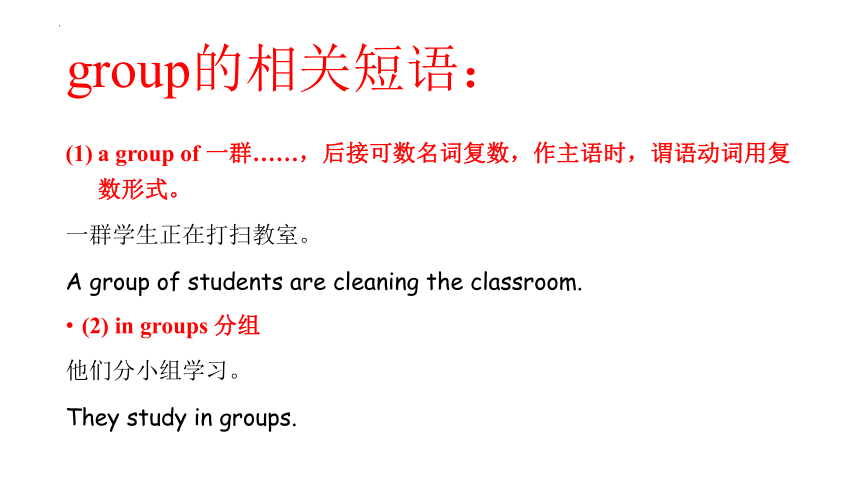
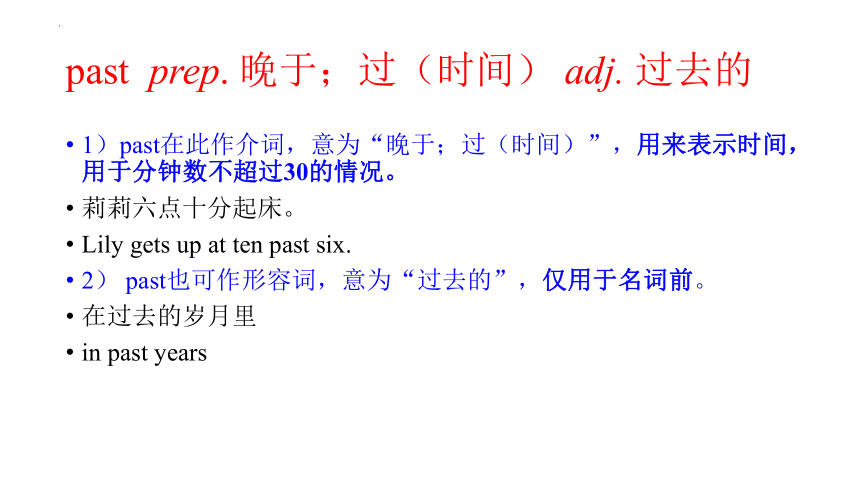
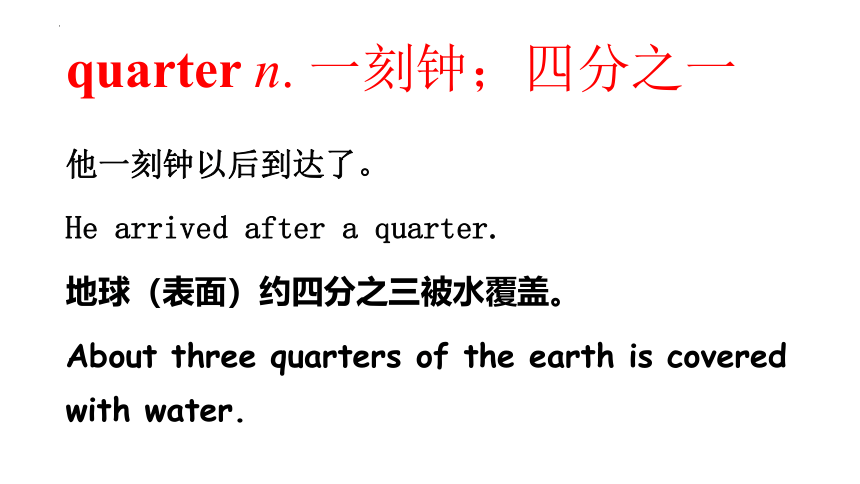
文档简介
(共22张PPT)
人教版英语七年级下册Unit 2 Section B
词汇讲解
exercise v.& n.锻炼;练习
exercise在此处作动词,意为“锻炼”。
我的爷爷奶奶天天锻炼身体。
My grandparents exercise every day.
exercise还可作名词,常见用法如下:
不可数名词
表示“锻炼;运动”,常和take, do, get等词连用
可数名词
表示“一套动作”或“练习,习题”,如do morning exercises做早操
我们应该每天锻炼身体。
We should take exercise every day.
我们经常在英语课上做练习。
We often do exercises in English class.
exercise的一词多义:
do/take exercise
做运动;锻炼
do eye exercises
做眼保健操
do math exercises
做数学练习题
best adj. 最好的;adv. 最好地;最
(1) best在句中作形容词,是good的最高级形式。
我认为吉尔的计划最棒。
I think Jill’s plan is the best.
(2) best还是副词well的最高级,意为“最好地;最”。
在我们班,凯特英语说得最好。
Kate speaks English best in our class.
group n. 组;群
group 是集体名词,作主语时,若看作一个整体,谓语动词用单数形式;若强调其中的成员,则谓语动词用复数形式。
我们组有一些优秀的球员。
Our group has some good players.
整个小组的成员都很年轻。
The whole group are young.
group的相关短语:
a group of 一群……,后接可数名词复数,作主语时,谓语动词用复数形式。
一群学生正在打扫教室。
A group of students are cleaning the classroom.
(2) in groups 分组
他们分小组学习。
They study in groups.
past prep. 晚于;过(时间) adj. 过去的
1)past在此作介词,意为“晚于;过(时间)”,用来表示时间,用于分钟数不超过30的情况。
莉莉六点十分起床。
Lily gets up at ten past six.
2) past也可作形容词,意为“过去的”,仅用于名词前。
在过去的岁月里
in past years
quarter n. 一刻钟;四分之一
他一刻钟以后到达了。
He arrived after a quarter.
地球(表面)约四分之三被水覆盖。
About three quarters of the earth is covered with water.
quarter的一词多义:
一刻钟
四分之一
. run v. 跑;奔
run作动词, 意为“跑;奔”,其现在分词形式为running。
runner作名词,意为“跑步者”。
e.g.这个男孩擅长跑步,每天早上他都与其他跑步者在公园跑步。
The boy is good at running.
He runs with other runners in the park every morning.
run 作动词,还可意为“掉色;经营”。
e.g.这个颜色在热水里会掉色。
The color will run in hot water.
经营一家酒店
run a hotel
clean v. 打扫;弄干净 adj. 干净的
(1)clean在此作及物动词,意为“打扫;弄干净”,
其后可以直接跟宾语。
萨姆,你必须打扫你的卧室。
Sam, you must clean your bedroom.
(2)clean还可作形容词,意为“干净的”,
其反义词为dirty(脏的)。
她的房间既漂亮又干净。
Her room is beautiful and clean.
clean的一词多义:
v. 打扫
adj.干净的
take a walk 散步
take a walk 意为“散步;走一走”,其同义短语为have a walk和go for a walk。
walk在此处作名词,意为“行走;步行”。
晚饭后,我爷爷经常去散步。
My grandfather often takes a walk after dinner.
walk还可作动词,意为“行走;步行”。是不及物动词。
这个宝宝正在学走路。
The baby is learning to walk.
她每天步行上学。
She walks to school every day.
sometimes, sometime, some times与some time
either...or... 要么……要么……;或者……或者……
either… or...连接句中两个独立的词、短语或句子,表示一种选择。其中either作连词,意为“或者”。
你可以吃苹果,也可以吃香蕉。
You can have either the apple or the banana.
我想钥匙不是在我包里就是在桌上。
I think the key is either in my bag or on the table.
either... or...连接两个名词或代词作主语时,谓语动词应该与离其最近的那个名词或代词在人称和数上保持一致,也就是遵循“ 就近原则”。
Either you or your sister has to stay at home. 要么你,要么你妹妹必须待在家里。
与your sister(保持数的一致)
either还可作副词,意为“也”,用在否定句的末尾。
彼得不能去,我也不能。
Peter can’t go and I can’t either.
be good for 对……有好处
be good for为固定短语,其反义短语为be bad for(对......有害)。
阅读对你的写作有益。
Reading is good for your writing.
看太多电视对你的眼睛不好。
Watching too much TV is bad for your eyes.
taste v.有……的味道;品尝 n.味道;滋味
(1)taste在句中作连系动词,意为“有......的味道”,其后接形容词作表语。
这汤尝起来很美味。
The soup tastes delicious.
(2)taste也可作实义动词,意为“品尝”。
你可以尝尝这些菜。
You can taste these dishes.
(3)taste还可作名词,意为“味道;滋味”。
这药有一种甜甜的味道。
The medicine has a sweet taste.
taste作名词,还可意为“品味;欣赏力”。
他有很高的音乐欣赏力。
He has very good taste in music.
常见的感官动词有:
谢谢观看
Thank you for watching!
人教版英语七年级下册Unit 2 Section B
词汇讲解
exercise v.& n.锻炼;练习
exercise在此处作动词,意为“锻炼”。
我的爷爷奶奶天天锻炼身体。
My grandparents exercise every day.
exercise还可作名词,常见用法如下:
不可数名词
表示“锻炼;运动”,常和take, do, get等词连用
可数名词
表示“一套动作”或“练习,习题”,如do morning exercises做早操
我们应该每天锻炼身体。
We should take exercise every day.
我们经常在英语课上做练习。
We often do exercises in English class.
exercise的一词多义:
do/take exercise
做运动;锻炼
do eye exercises
做眼保健操
do math exercises
做数学练习题
best adj. 最好的;adv. 最好地;最
(1) best在句中作形容词,是good的最高级形式。
我认为吉尔的计划最棒。
I think Jill’s plan is the best.
(2) best还是副词well的最高级,意为“最好地;最”。
在我们班,凯特英语说得最好。
Kate speaks English best in our class.
group n. 组;群
group 是集体名词,作主语时,若看作一个整体,谓语动词用单数形式;若强调其中的成员,则谓语动词用复数形式。
我们组有一些优秀的球员。
Our group has some good players.
整个小组的成员都很年轻。
The whole group are young.
group的相关短语:
a group of 一群……,后接可数名词复数,作主语时,谓语动词用复数形式。
一群学生正在打扫教室。
A group of students are cleaning the classroom.
(2) in groups 分组
他们分小组学习。
They study in groups.
past prep. 晚于;过(时间) adj. 过去的
1)past在此作介词,意为“晚于;过(时间)”,用来表示时间,用于分钟数不超过30的情况。
莉莉六点十分起床。
Lily gets up at ten past six.
2) past也可作形容词,意为“过去的”,仅用于名词前。
在过去的岁月里
in past years
quarter n. 一刻钟;四分之一
他一刻钟以后到达了。
He arrived after a quarter.
地球(表面)约四分之三被水覆盖。
About three quarters of the earth is covered with water.
quarter的一词多义:
一刻钟
四分之一
. run v. 跑;奔
run作动词, 意为“跑;奔”,其现在分词形式为running。
runner作名词,意为“跑步者”。
e.g.这个男孩擅长跑步,每天早上他都与其他跑步者在公园跑步。
The boy is good at running.
He runs with other runners in the park every morning.
run 作动词,还可意为“掉色;经营”。
e.g.这个颜色在热水里会掉色。
The color will run in hot water.
经营一家酒店
run a hotel
clean v. 打扫;弄干净 adj. 干净的
(1)clean在此作及物动词,意为“打扫;弄干净”,
其后可以直接跟宾语。
萨姆,你必须打扫你的卧室。
Sam, you must clean your bedroom.
(2)clean还可作形容词,意为“干净的”,
其反义词为dirty(脏的)。
她的房间既漂亮又干净。
Her room is beautiful and clean.
clean的一词多义:
v. 打扫
adj.干净的
take a walk 散步
take a walk 意为“散步;走一走”,其同义短语为have a walk和go for a walk。
walk在此处作名词,意为“行走;步行”。
晚饭后,我爷爷经常去散步。
My grandfather often takes a walk after dinner.
walk还可作动词,意为“行走;步行”。是不及物动词。
这个宝宝正在学走路。
The baby is learning to walk.
她每天步行上学。
She walks to school every day.
sometimes, sometime, some times与some time
either...or... 要么……要么……;或者……或者……
either… or...连接句中两个独立的词、短语或句子,表示一种选择。其中either作连词,意为“或者”。
你可以吃苹果,也可以吃香蕉。
You can have either the apple or the banana.
我想钥匙不是在我包里就是在桌上。
I think the key is either in my bag or on the table.
either... or...连接两个名词或代词作主语时,谓语动词应该与离其最近的那个名词或代词在人称和数上保持一致,也就是遵循“ 就近原则”。
Either you or your sister has to stay at home. 要么你,要么你妹妹必须待在家里。
与your sister(保持数的一致)
either还可作副词,意为“也”,用在否定句的末尾。
彼得不能去,我也不能。
Peter can’t go and I can’t either.
be good for 对……有好处
be good for为固定短语,其反义短语为be bad for(对......有害)。
阅读对你的写作有益。
Reading is good for your writing.
看太多电视对你的眼睛不好。
Watching too much TV is bad for your eyes.
taste v.有……的味道;品尝 n.味道;滋味
(1)taste在句中作连系动词,意为“有......的味道”,其后接形容词作表语。
这汤尝起来很美味。
The soup tastes delicious.
(2)taste也可作实义动词,意为“品尝”。
你可以尝尝这些菜。
You can taste these dishes.
(3)taste还可作名词,意为“味道;滋味”。
这药有一种甜甜的味道。
The medicine has a sweet taste.
taste作名词,还可意为“品味;欣赏力”。
他有很高的音乐欣赏力。
He has very good taste in music.
常见的感官动词有:
谢谢观看
Thank you for watching!
同课章节目录
- Unit 1 Can you play the guitar?
- Section A
- Section B
- Unit 2 What time do you go to school?
- Section A
- Section B
- Unit 3 How do you get to school?
- Section A
- Section B
- Unit 4 Don't eat in class.
- Section A
- Section B
- Unit 5 Why do you like pandas?
- Section A
- Section B
- Unit 6 I'm watching TV.
- Section A
- Section B
- Review of Units 1-6
- Unit 7 It's raining!
- Section A
- Section B
- Unit 8 Is there a post office near here?
- Section A
- Section B
- Unit 9 What does he look like?
- Section A
- Section B
- Unit 10 I'd like some noodles.
- Section A
- Section B
- Unit 11 How was your school trip?
- Section A
- Section B
- Unit 12 What did you do last weekend?
- Section A
- Section B
